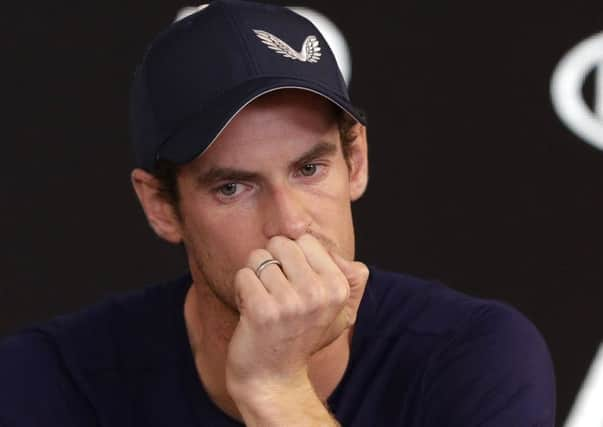Andy Murray is about much more than tennis '“ leader comment


As he announced he was being forced to retire from tennis through injury, Sir Andy Murray repeatedly bowed his head to wipe away tears and attempt to hide his emotions behind the brim of his baseball cap.
It was an emotional moment for one of Scotland’s greatest ever sporting figures that produced an equally emotional outpouring of support in response.
Advertisement
Hide AdAdvertisement
Hide AdFor Murray was much more than simply a great in the world of tennis. He was also an inspirational and much-loved figure, someone who was not afraid to speak out over contentious issues like drugs and, particularly, sexism in sport.
It was clear that he was blessed with considerable tennis talent from an early age. But this wiry kid from Dunblane – a town that was hardly a hotbed of tennis prodigies – did not have it easy. He is someone who has had to work extremely hard for the astonishing success he has achieved.
Not only did he become the first male British player to win Wimbledon since Fred Perry in 1936 and claim two other Grand Slams, the Davis Cup and two Olympic Gold medals, but he did so at a time when three of the greatest players ever to play the game – Roger Federer, Rafael Nadal and Novak Djokovic – were in their pomp. The Big Three became the Big Four as he seized the number one spot in the world rankings. Murray admitted it was a “tough era”, but said it had been a “privilege” to play against them.
And we watched him every step of the way in this most gladiatorial of sports, witnessing early disappointments that made some doubt he would ever truly make it. But the tears that flowed in games like his 2012 Wimbledon defeat to Federer only made his later successes all the more special, all the more deserved. They took grit, real character.
It would have been easy to do what many budding sports stars do – succumb to the trappings of wealth, to the shallow pleasures that often prove too enticing to young people with money. But he did not. He did buy a Ferrari but, in a telling decision, gave it back after a few months; he later confessed he had only bought the car because he briefly gave in to “peer pressure” and had never really liked it.
But such a story should not leave anyone with the impression that Murray was shy and retiring. How many stars of any kind would turn up in the audience of a show like the BBC’s Mock the Week and manage to steal a few of the laughs when the camera was turned on him?
And he was unafraid to take on the game’s problems, like performance-enhancing drugs, and wider societal ones like sexism. “I think taking a prescription drug that you don’t necessarily need, but just because it’s legal, that’s wrong, clearly. That’s wrong ... you’re just using it for the performance-enhancing benefits that drug is giving you,” he said after Maria Sharapova failed a drugs test.
Some of his finest moments came when he calmly corrected the casual sexism of sports reporters who at times seemed to forget the existence of the women’s game.
Advertisement
Hide AdAdvertisement
Hide AdFellow British pro Heather Watson wrote on social media that Murray had a “heart of pure gold” and was “pretty gosh darn Awesome (with a capital A)”. “You’re definitely one of the most liked and respected players on the tour. I know all of us girls in the locker room are in awe and so grateful for how you always fight in our corner!” she said. Tennis legend Billie-Jean King suggested his “greatest impact on the world may be yet to come”, adding: “Your voice for equality will inspire future generations.”
Murray may have tried to hide his emotions as he contemplated retirement, but he triumphed in a sport that offers no hiding place. And when serious issues arose, again he did not hide, but confronted them head-on.
For all his greatness as a tennis player, it is qualities such as these that really matter.